This website uses cookies so that we can provide you with the best user experience possible. Cookie information is stored in your browser and performs functions such as recognising you when you return to our website and helping our team to understand which sections of the website you find most interesting and useful.
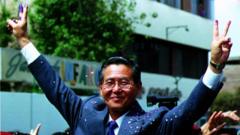
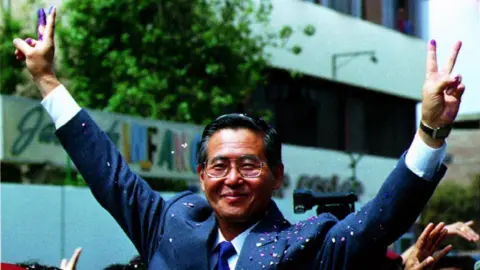 Reuters
ReutersPeru's former President Alberto Fujimori, who was convicted of human rights abuses and corruption, has died aged 86.
Fujimori governed Peru between 1990 and 2000 before being forced from office amid allegations of corruption.
His tough stance against a left-wing guerrilla insurgency at a time when the rebels looked likely to seize power won him plaudits from many.
But his war on the insurgents also resulted in serious abuses - such as the killing of 25 people by government-backed death squads, for which he was given a lengthy jail sentence.
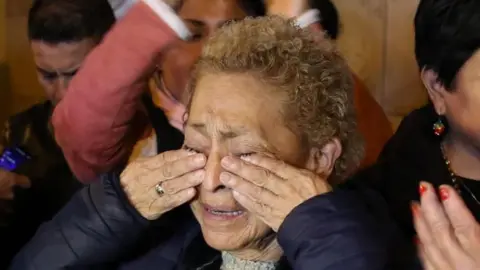 EPA
EPAIn a sign of the support he still enjoyed more than two decades after leaving office, teary Peruvians began gathering outside his house as soon as his four children had announced his death.
Some chanted "Alberto Fujimori, national hero".
Keiko, Hiro, Sachie and Kenji Fujimori had earlier posted a joint statement, which said: "After a long battle with cancer, our father, Alberto Fujimori, has just departed to meet the Lord."
Fujimori's doctor, José Carlos Gutiérrez, confirmed the former president had been diagnosed with "tongue cancer" and had died "of complications from the illness... at around 18:00 [23:00 GMT]" on Wednesday.
While his loyal supporters praised Fujimori for saving Peru from the Sendero Luminoso (Shining Path) rebel group, thousands of victims caught up in the armed conflict have been denouncing him as an authoritarian figure and a brutal leader.
They recalled how death squads had killed rebels and those they suspected of backing them under his government.
The son of Japanese immigrants, was first elected president when the rebel insurgency was at its height.
His government eventually managed to defeat the brutal Maoist rebel group Shining Path, but at a very high human cost.
His authoritarian government's crackdown resulted in the deaths of an estimated 69,000 people.
His time in office was marked by many dramatic twists and turns.
He was lauded for ushering in one of the most economically stable periods in Peru with his radical austerity measures - dubbed "Fujishock" - credited with putting the economy back on track and neining in skyrocketing inflation.
In 1992, two years after taking office, Fujimori closed Congress, accusing lawmakers of preventing him from taking the measures the country needed, a move which was denounced as undemocratic and authoritarian.
One of the key moments of his presidency - which cemented Fujimori's reputation for talking and acting tough - was the 1996/97 hostage siege.
Marxist rebels belonging to the Túpac Amaru Revolutionary Movement (MRTA), stormed the Japanese ambassador's residence in Lima and took 72 people hostage.
After a four-month stand-off, Fujimori sent in commandos to take the building. When all 14 rebels were killed and nearly all the hostages were rescued in the operation, his decisiveness was widely praised.
But after a decade in office, allegations of corruption saw him flee the country.
He sought asylum in Japan before returning to Chile, where he was arrested and extradited to Peru.
He was convicted first of embezzlement and, while already in prison, of human rights violations that targeted mainly poor indigenous communities.
Last December, Fujimori was released from Lima's Barbadillo prison after Peru's constitutional court reinstated a presidential pardon issued six years previously.
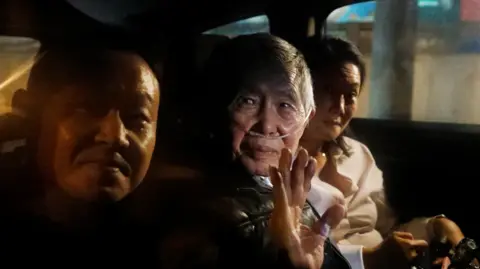 Getty Images
Getty ImagesHis daughter Keiko was one of his most vocal defenders throughout his life and is also his political heir.
She is the leader of Peru's conservative People's Force party and has tried to follow in her father's footstep by running for president three times.
In July, she had announced that she would back her father's candidacy for president in 2026 - a remark which caused surprise as he would have been 87 at the time.
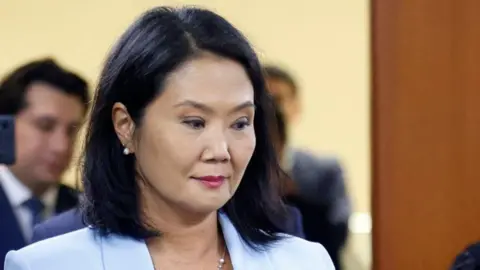 Getty
GettyFollowing his death, she is widely expected to be her party's presidential candidate.
She said her father would be buried on Saturday and added that his supporters would be offered the chance to file past his coffin at the National Museum in the capital, Lima, beforehand.
The Peruvian government has declared three days of national mourning.



 Africana55 Radio
Africana55 Radio 

